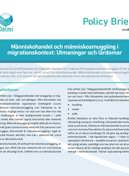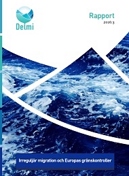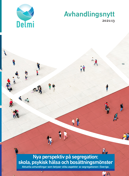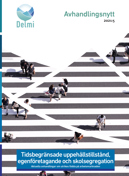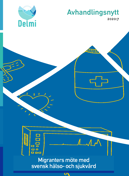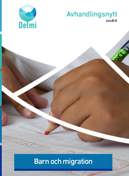The authors make unique contributions grounded in several academic disciplines, including law, international relations, criminology, political science, and gender studies. The report is based on the following studies:
- Teresa Quintel’s (2021) dissertation highlights how EU law, in the area of migration, border control and asylum, allows for a lowering of data protection rights of third country nationals. From a juridical perspective, Quintel argues that the unclear delineation between migration management and law enforcement have repercussions for the personal integrity of people seeking to enter the European Union.
- Daniel Silberstein’s (2020) dissertation examines the role of the European Border and Coast Guard Agency, Frontex, in constructing understandings of borders, practices, and people in these spaces. Silberstein highlights the importance of images in performing borders, how risk and unease are produced and how Frontex is normalised as the central actor at the EU’s external borders.
- Louise Bengtsson’s (2019) dissertation explores how the notion of “health security” has become associated with external, cross-border threats to health. In the article included in this anthology, Bengtsson examines how public health officials in EU institutions pursued determined efforts to counter narratives of migrants as carriers of infectious disease during the 2015 European refugee crisis.
- Jennie Brandén’s (2022) dissertation shifts focus from the management of migrants at the external borders of Europe to security measures in a Swedish integration context. Brandén shows through several case studies how safety is commodified and sold – for example through outsourcing of responsibility for safety to the private security industry or through the safety certification of city centres. Brandén concludes that the result is that safety is provided to some, at the expense of others.
- In similarity to Brandén, Leandro Schclarek Mulinari’s (2020) dissertation investigates how security measures in a Swedish context can increase unsafety and insecurity for some. Schclarek Mulinari analyses the practices of authorities, such as the police and the Swedish Security Service, through the perspective of the alleged threats to safety. Schclarek Mulinari makes the conclusion that racialized people in general, and Muslims in particular, are targets of disproportionate security controls.
Although the dissertations included in this report differs remarkably in terms of subject area, methodology and academic discipline, they share a common concern for the consequences of the intertwinement of security agendas with migration- and integration issues. When efforts are made to create a more safe and secure Europe, the authors raise the question: Security for whom? Together, the dissertations show that security measures taken both at national- and international levels produce consequences for millions of people. These consequences are mainly conceptualized in terms of (in)securitization or (un)safety, which underline that the efforts aimed at strengthening borders or combating crime can have a negative impact on already marginalized and vulnerable groups.
Migration, control and security in s (2021: x) is part of Delmi’s Dissertation Series and was published datum. On behalf of Delmi, Lisen Löwstedt and Suzanne Planchard have written and compiled this report.
Publication date: April 12th 2023
Photo: Scott Webb, Unsplash


